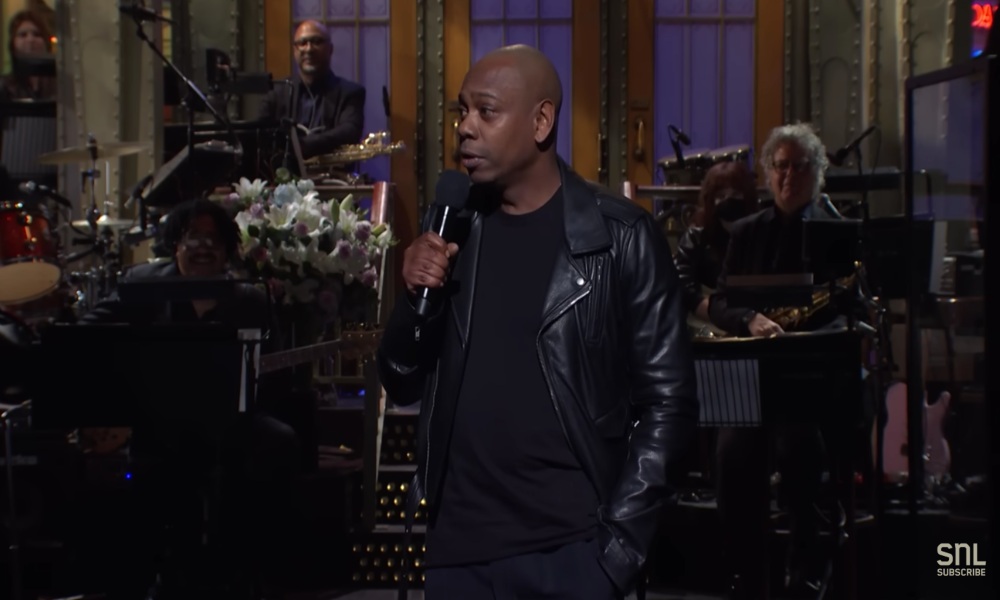While many mainstream, A-list celebrities have taken to social media over the past several weeks to condemn Ye’s (formerly Kanye West) antisemitic remarks, comedian Dave Chappelle had other ideas.
Chappelle’s opening monologue in the November 12 episode of Saturday Night Live stirred controversy among viewers who were unsure whether Chappelle was amplifying Ye’s antisemitic tropes—like that Jews control the media or Hollywood—or just making fun of it.
In the approximately 15-minute monologue, Chappelle said that he learned early in his career that “there are two words in the English language that you should never say together in sequence, and those words are ‘the’ and ‘Jews.’”
After underscoring the absurdity of Ye’s October tweet, in which he said he wanted to go “death con 3 on JEWISH PEOPLE” after taking a nap, Chappelle implied that while certain tropes about Jewish people may be true, people shouldn’t talk about them.
“If they’re Black then it’s a gang, if they’re Italian then it’s a mob, but if they’re Jewish then it’s a coincidence and you should never speak about it,” Chappelle said.
He went on to say “I’ve been to Hollywood, it’s just what I saw, it’s a lot of Jews. Like a lot,” said Chappelle. “But that didn’t mean anything, you know what I mean, there’s a lot of Black people in Ferguson, Missouri, but that doesn’t mean we run the place.”
Chappelle has stirred other controversies in recent years. His Netflix special, The Closer, featured a punchline in which he purposefully misgendered a transgender person, leading many to label him a transphobe.
Hannah Einbinder, a Jewish comedian and star in HBO’s “Hacks,” said that Chappelle’s remarks were antisemitic, the Jewish Telegraphic Agency reported. On the other hand, Jon Stewart, Jewish comedian, former host of The Daily Show, and a friend of Chappelle’s, defended his comments. “Look at it from a Black perspective. It’s a culture that feels that its wealth has been extracted by different groups,” Stewart said in a November 15 interview with late-night host Stephen Colbert. “That’s the feeling in that community, and if you don’t understand where it’s coming from, then you can’t deal with it.”
He went on to say “I’m afraid that the general tenor of conversation in this country is, cover it up, bury it, put it to the outskirts and don’t deal with it,” Stewart said.
The Anti-Defamation League’s Jonathan Greenblatt condemned the monologue on Twitter, and the resulting thread was heated. Randi Weingarten, president of The American Federation of Teachers, agreed with Greenblatt, tweeting that “It was chilling to watch. No trauma should be laughed at, or made fun of—none.”
Another user, defending Chappelle, pointed out that Jewish comedians such as Mel Brooks, have not shied away from using taboo racial humor to make a point, citing Blazing Saddles as an example.
We shouldn’t expect @DaveChappelle to serve as society’s moral compass, but disturbing to see @nbcsnl not just normalize but popularize #antisemitism. Why are Jewish sensitivities denied or diminished at almost every turn? Why does our trauma trigger applause?
— Jonathan Greenblatt (@JGreenblattADL) November 13, 2022
Other Twitter users weighed in with their thoughts
Ok I’ll be honest!!! As a Jewish American Dave Chappelle’s SNL monologue really scared me!!!!!!
— ilana peña (@ilanacubana) November 14, 2022
That Dave Chappelle SNL monologue probably did more to normalize anti-Semitism than anything Kanye said
— Adam Feldman (@FeldmanAdam) November 13, 2022
But the dismay was not unanimous, reflecting differences within the Jewish community.
Dave Chappelle has offended everyone in his career bc it’s his job, to address the uncomfortable. There’s a diff btwn bigotry and social commentary. It’s not for the faint of heart but if we’re gonna survive, we have to understand nuance. Last night was Carlin level shit.
— Jonathan Goldman (@akjakalope) November 13, 2022
In a November 15 article in The Atlantic, Yair Rosenberg wrote that Chappelle is correct about it being more difficult to joke about antisemitism. In Rosenberg’s estimation, it’s because antisemitic or conspiratorial language has become more common.
“The problem, I realized, is that as anti-Semitism and related conspiracy theories become more normalized in our discourse, it becomes harder to laugh about them, because you never know who might not get the joke,” Rosenberg wrote.
In response to Chappelle’s SNL monologue, Jerry Seinfeld told The Hollywood Reporter that “I did think the comedy was well-executed, but I think the subject matter calls for a conversation that I don’t think I’d want to have in this venue.”
Discussions around strings of covert or overt antisemitism in the media have been ongoing since Ye’s “death con” tweet. His comments have inspired acts of antisemitism throughout the United States, including in Los Angeles where a hate group hung up a sign over a freeway that read “Kanye is right about the Jews.” Ye’s comments and influence have also heartened users of online white supremacist platforms who claim to be seeing “unprecedented success” as a result of Ye’s words and actions.
Fans of Ye have shared varying perspectives on how their fandom for the artist has or has not changed. Celebrities, including ex-wife Kim Kardashian, have also expressed their disappointment with his statements.
“This is a classic debate question about whether or not we can separate the art from the artist,” Jason Del Gandio, a communications and social influence professor at Temple University, says in regards to Ye. “If it’s something small and miniscule, then we’re all human, we all make mistakes, but obviously in this case, this was not a mistake.”


There’s little difference between Chapelle, Ye and Farrakhan. Black antisemites.